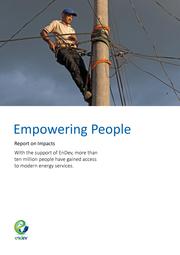EnDev Report on Impacts
Report
Empowering People
Between September 2005 and December 2012 EnDev facilitated access to sustainable energy services for 10.3 million
people. EnDev is mainly active in Africa but is also engaged in Asia and Latin America.
On average, EnDev does not spend more than 20 EUR per capita, which is very cost effective in comparison to other
programmes. The multi national development initiative has successfully launched markets for modern cookstoves, solar
lighting systems and mini-hydro plants in its partner countries. It promotes the expansion of the electricity grid as well
as isolated solutions in remote regions. In areas with electricity grids, EnDev develops concepts to enable people in the
proximity to afford a connection.
Which impact has EnDev achieved?
Access to energy is a tool to improve livelihoods. The dissemination of modern energy devices can improve living conditions for people. Energy access figures are relati vely easy to gather. It is much harder however to quantify and qualify
impacts on productivity, poverty, health, gender, education as well as on environment & climate. EnDev has therefore
commissioned a large number of studies. These studies prove the positive impact of the EnDev programme.
Reduced Poverty & Productive Use: In cooperation with its partners, EnDev has enabled 10.3 million people, 11,600 social
institutions and 24,300 small and medium sized enterprises to gain access to energy. EnDev has also trained 30,000
stove builders, craftsmen, vendors, operators and technicians. Stove builders and solar companies alone achieved monthly
revenues of over 8.2 million EUR in 2010 and 14.6 million EUR in 2012.
Gender: Electricity and modern cookstoves facilitate the work of women and girls. Electric lighting improves living and
working conditions at home, while modern stoves cook faster and cleaner, use less firewood and save up to 40 per cent of
time that would be otherwise be spent searching for firewood. Women benefit from job creation, too, as shown by a study
in Kenya, where women account for almost half of all modern stove builders, installers and marketers.
Health: Modern stoves and lighting systems reduce emissions caused by traditional stoves or three-stone fires and by
kerosene lamps and candles. The stoves promoted by EnDev on average emit 30 to 40 per cent less carbon monoxide and
other pollutants such as nitrogen oxides, benzene or formaldehyde than the baseline stoves traditionally used. An EnDev
study in Peru reveals that 70.5 per cent of tradit onal stove users complain about coughing attacks, whereas only 6.1
per cent of modern stove users do so.
Education: To date, EnDev and its partners have supported 6,400 schools to gain access to modern energy services. It is
expected that this will lead to better learning and higher success rates.
Environment & Climate: Today, at a conservative estimate, more than 1.8 million stoves are improving the lives of
8.37 million people; almost two million people are benefitting from modern lighting. Every stove saves up to 0.59 tonnes
of CO2 equivalent each year. This adds up to approximately 997,000 tonnes of CO2 per year. The wood and charcoal stoves
promoted by EnDev save up to 973,000 tonnes of firewood each year which reduces degradation of forests. Although it
cannot assume that this entire forest area will remain, it is clear - and has been confirmed by several studies - that the
pressure on forests is lowered.
Further Information
An older version of the Report on impacts is accessible here.




















